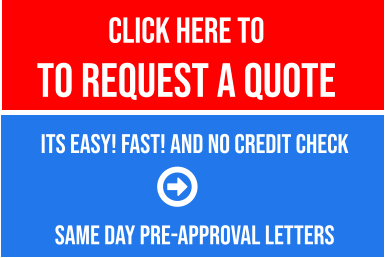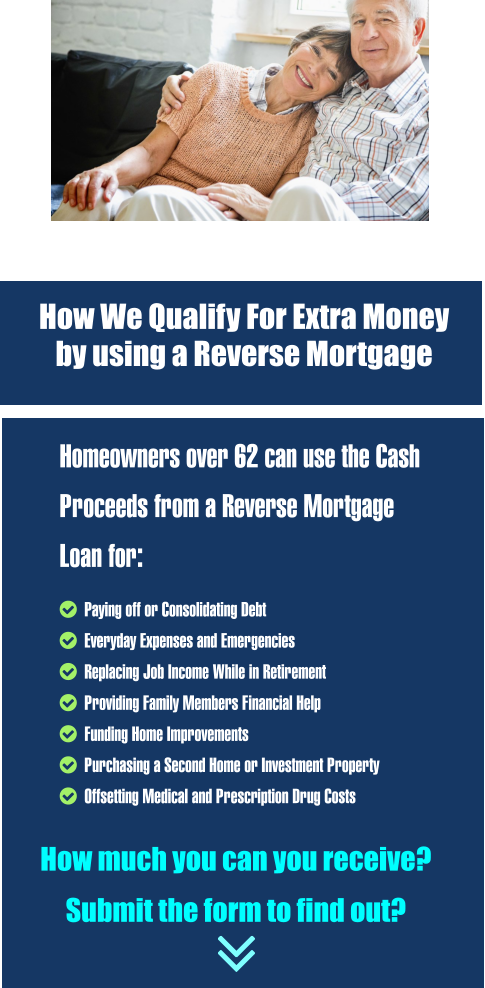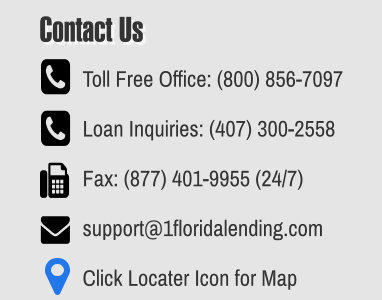





1st Florida Lending Corp., a registered Mortgage Lender
Orlando servicing only the State of Florida, offering over
48 loans programs including Conventional Loans, Non-
Conforming Loans, FHA Loans, VA Loans, USDA Loan,
Self-Employed Loans, Bank Statement Loans, No-Doc
Loans, Reverse Mortgage Loans, ITIN Loans, Rental
Investment Loans, to name a few and specializing in
Bank Statement Loans or “stated loans” requiring no Tax
Return verification and much more. * No broker or
lender fees are for FHA,VA, USDA and Conventional
loan types
Main Office: 2151 Consulate Dr. * Suite 8 * Orlando,
FL., 32837 * Telephone * (800)856-7097 * (800) 655-
1345 * (407) 300-2558 * Fax (877) 401-9955
* Disclaimer: All Loan programs, rates and terms can
change without notice and are subject to credit and
underwriting approval. Loan charts highlight min/max
constraints, assumptions & random scenarios only. We will
always work hard to approve your loan but there are no
guarantees of any kind expressed or implied that any loan
we be approved. Licensed in Florida Only. When Banks
Say No ! We Say YES ! ® is a registered trademark owned
by 1st Florida Lending Corp. Florida lender license #
MLD106.
© 2007 - 2025 1st Florida Lending Corp. - All rights reserved






TURNED DOWN BY YOUR LENDER? CALL US!


Understanding Reverse Mortgages: A
Guide for Homeowners
A reverse mortgage can be a valuable
financial tool for homeowners aged 62
or older who are looking to supplement
their retirement income. It allows you to
convert the equity in your home into
cash without having to sell your home or
take on a monthly mortgage payment.
But how does a reverse mortgage work,
and is it the right option for you? Let’s
break it down.
What is a Reverse Mortgage?
A reverse mortgage is a loan that allows
homeowners to borrow money against
the value of their home. Unlike a tradi-
tional mortgage, you don’t make
monthly payments to the lender.
Instead, the loan balance increases over
time and is repaid when you sell the
home, move out, or pass away.
The most common type of reverse mort-
gage is the Home Equity Conversion
Mortgage (HECM), which is backed by
the U.S. Federal Government. There are
also proprietary reverse mortgages,
which are offered by private lenders and
may have different features or
requirements.
How Does a Reverse Mortgage Work?
•
Eligibility: To qualify for a reverse
mortgage, you generally must be 62 or
older, own your home outright or have a
low mortgage balance, and live in the
home as your primary residence.
•
Loan Amount: The amount you can
borrow depends on several factors, in-
cluding your age, the value of your
home, the interest rates, and the lending
limit in your area. Older homeowners
generally qualify for higher loan
amounts.
•
Payment Options: You can choose
how you want to receive the loan pro-
ceeds, such as:
1.
Lump sum
2.
Monthly payments (for a specific
period or as long as you live in the
home)
3.
Line of credit
4.
A combination of the above
•
Repayment: Unlike traditional mort-
gages, reverse mortgages don’t require
monthly payments. Instead, the loan is
repaid when the borrower sells the
home, moves out, or passes away. If
there’s any equity left after the loan is re-
paid, it goes to the homeowner or their
heirs.
Benefits of Reverse Mortgages
1.
Supplement Retirement Income: A
reverse mortgage can provide additional
cash flow to cover expenses like health-
care, home maintenance, or daily living
costs without having to sell your home.
2.
No Monthly Payments: You don’t
have to worry about making monthly
payments, as the loan is repaid when
you sell or move out of the home.
3.
Stay in Your Home: With a reverse
mortgage, you can continue living in
your home for as long as you meet the
loan requirements (such as paying prop-
erty taxes and maintaining the home).
4.
Tax-Free Income: The money you re-
ceive from a reverse mortgage is gener-
ally not taxable, as it is considered a
loan advance.
Considerations and Potential Risks
While a reverse mortgage can offer fin-
ancial relief, there are some important
factors to keep in mind:
•
Accumulating Loan Balance: Over
time, the amount you owe increases due
to interest and fees. This could mean
your heirs might not inherit as much, or
in some cases, the sale of the home
may not cover the full loan balance.
•
Impact on Benefits: Reverse mort-
gage payments could affect your eligibil-
ity for government programs like
Medicaid or Supplemental Security
Income (SSI), so it’s important to con-
sult with a financial advisor.
•
Homeownership Responsibilities:
You still have to maintain the home, pay
property taxes, and cover homeowner’s
insurance. Failing to do so could result
in the loan being called due.
Final Thoughts
If you’re looking for ways to leverage the
equity in your home and secure financial
freedom during retirement, a reverse
mortgage may be a viable solution.
Need Quote and more Information?
Click Here to request a quote and one of
our experienced loan officers will con-
tact to guide you through the process
and help you make the best choice for
your future.
Call 407-300-2558
We offer over 48 loan programs in every
county in the State of Florida as follows;
Alachua County,Baker County,Bay
County,Bradford County,Brevard County,Broward
County,Calhoun County,Charlotte County,Citrus
County,Clay County,Collier County,Columbia
County,DeSoto County,Dixie County,Duval
County,Escambia County,Flagler County,Franklin
County,Gadsden County,Gilchrist County,Glades
County,Gulf County,Hamilton County,Hardee
County,Hendry County,Hernando
County,Highlands County,Hillsborough
County,Holmes County,Indian River
County,Jackson County,Jefferson
County,Lafayette County,Lake County,Lee
County,Leon County,Levy County,Liberty
County,Madison County,Manatee County,Marion
County,Martin County,Miami-Dade
County,Monroe County,Nassau County,Okaloosa
County,Okeechobee County,Orange
County,Osceola County,Palm Beach
County,Pasco County,Pinellas County,Polk
County,Putnam County,Santa Rosa
County,Sarasota County,Seminole County,St.
Johns County,St. Lucie County,Sumter
County,Suwannee County,Taylor County,Union
County,Volusia County,Wakulla County,Walton
County,Washington County














